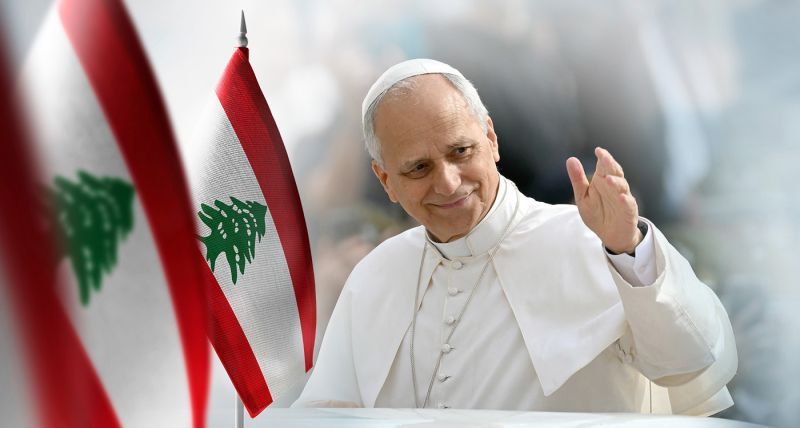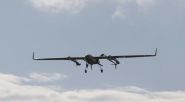
With less than two weeks to go before Pope Leo XIV’s visit to Lebanon at the end of the month, preparations have entered their final stage. Roger Zaccar, head of the visit’s financial committee, told This is Beirut that nearly 80% of the required funds have already been secured, with the remaining 20% are still needed to complete the program.
While the exact budget has not been officially disclosed, it is said to be in line with other papal visits and roughly matches the cost of Benedict XVI’s 2012 trip to Lebanon, estimated at around $5 million, well within a reasonable range for an event of this scale.
The Committee’s Formation: An Institutional and Ecclesiastical Framework
The organization of the visit is built on a clearly defined structure established as soon as the Pope officially accepted the invitation. Following the invitation from the Lebanese state and Bkerke, the Assembly of Patriarchs and Bishops of Lebanon promptly formed a dedicated committee, chaired by Mgr. Michel Aoun, to oversee all preparations. The committee coordinates every aspect of the visit, including protocol, religious ceremonies, security, logistics, and relations with the Apostolic Nunciature.
Within this framework, an independent financial committee, led by Zaccar, was created to guarantee full transparency in fund management. The committee works in close collaboration with the Presidency, relevant ministries, the Apostolic Nunciature, and various ecclesiastical authorities.
How Are the Expenses Allocated?
For Pope Leo XIV’s visit, scheduled from November 30 to December 2, the Lebanese state is covering part of the organization through its public institutions. The Internal Security Forces (ISF), the Lebanese Armed Forces (LAF), and the Ministry of Interior will provide close protection, secure key sites, escort the papal procession, and manage control measures. The Ministry of Public Works has financed road resurfacing, painting, and signage along the routes the procession will take. The Presidency is also heavily involved, overseeing the official airport reception, preparations at the presidential palace, and the organization of the major Mass in downtown Beirut.
The Vatican covers all expenses related to the Pope’s travel, including the plane, the papal delegation, technical teams, official vehicles, internal security, and institutional communications.
The remaining costs, including temporary infrastructure, preparation of gathering spaces, logistics for the different stages of the visit, transportation for the faithful, equipment, and volunteer mobilization, are handled by the Lebanese financial committee. This is where most of the residual funding need remains.
Where Do the Funds Come From?
The financial committee entirely relies on voluntary donations from Lebanese patrons, members of the diaspora, and private individuals. A dedicated bank account has been established to channel contributions, allowing anyone who wishes to support the event to directly do so. “We have already secured around 80% of the required funds, but the remaining 20% is still needed. Every contribution counts, and the doors are always open,” Zaccar told This is Beirut.
Zaccar added that if an exceptional surplus were to arise, which is not the case at this stage, the unused funds would be redirected to educational and charitable institutions affiliated with the clergy.
A Strong Commitment to Transparency
In a country where trust in financial management is limited, transparency has become a top priority. “All donations go directly into the official bank account without intermediaries, and each contributor receives a receipt. At the end of the papal visit, we will publish a full financial report detailing all funds received and spent,” explained Zaccar.
Expenses are tracked in real time through an internal digital platform, ensuring continuous oversight and minimizing any risk of misuse. This approach is designed to address early criticisms, which have largely focused on the cost of a papal visit in a country facing a severe crisis. Zaccar calmly responds, “The Lebanese deserve for their country to present its best image. A papal visit is an event of immense historical and spiritual significance. The funds we receive are exclusively used for this purpose and, in most cases, would not have been allocated to humanitarian or social projects.”
Allegations of excessive spending are also mitigated by international comparisons. Papal visits elsewhere, particularly in Western Europe, often cost significantly more. In Lebanon, the bulk of the budget is devoted to logistics, temporary infrastructure, and transportation for the faithful coming from across the country.
A National Endeavor
Beyond the numbers, the visit carries profound political, moral, and symbolic significance. More than 25,000 people will be mobilized during the major gatherings, including volunteers, technical teams, security personnel, and pastoral coordinators. For Lebanon, battered by years of economic and institutional crises, the Pope’s visit offers a rare opportunity to come together and provide the country with a moment of hope and light.
“Which other event today has the power to bring together Lebanese of all faiths? Pope Leo XIV comes for everyone. This is far more than a visit: it is a message and a moment of national unity,” emphasizes Zaccar.
The remaining challenge is securing the final 20% of the budget. However, preparations have never paused. The operation continues around the clock, driven by a single guiding principle: to give Lebanon the most remarkable papal visit possible at a time when every ray of hope counts.




Comments